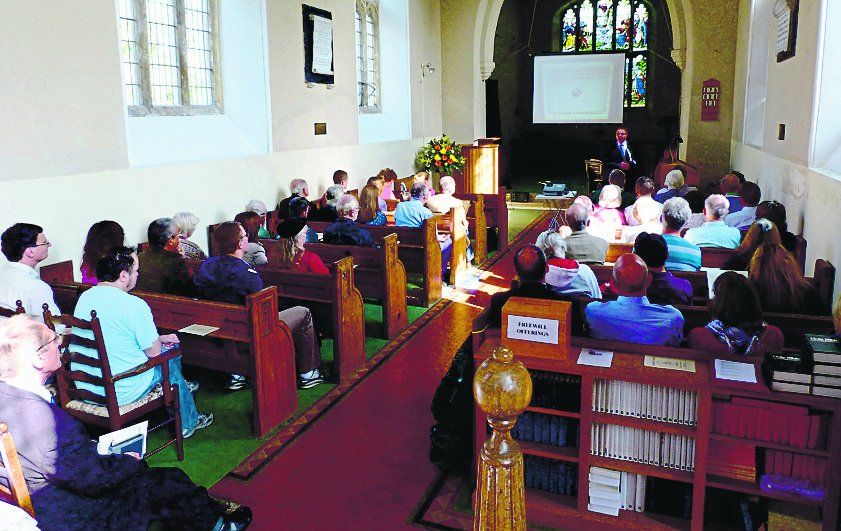
It is time to be more positive, but there is, of course, no single way of preaching the gospel properly. God uses preachers of many different styles and methods to call his elect. It would be very dull if we all used exactly the same approach. Certainly, I have neither the right nor the wish to prescribe a form of words, even in the controversial areas that we have been considering. Nor am I trying to deal with the whole subject.
Necessary elements
There are certain elements which should be present if the gospel is to be presented in a biblical manner, but God is not limited by our failure. The gospel may be preached really and effectively, in the mercy of God, even when it is not preached absolutely correctly according to the Word of God. And for this we should be very grateful, for who of us can claim that we preach the gospel perfectly? How many of us, who now insist on a Reformed theology, were converted through a message that fell far short of that? God is not bound; our rule, however, must not be his sovereign working, but his Word.
The previous articles have concentrated on one of these elements only: the relation between the doctrines of grace, like election, and our approach to the unbeliever. I have taken for granted such other matters as sin and judgement, heaven and hell, the person of Christ, his death as a substitutionary atonement and the necessity for denying oneself and taking up the cross. On all these, I would hope, there is no disagreement among us.
The doctrines of grace
More controversial is the question of how clearly, if at all, the doctrines of grace are to be set forth in this context. Should election be preached openly in an evangelistic address? Should it be made dear that Christ died only for the elect?

Many would deny this, quoting Whitefield (perhaps out of context) to the effect that we must come to the grammar school of repentance before we proceed to the university of predestination. However, to make that a rule would be to condemn the Lord himself who, as recorded in John’s Gospel, clearly told his hearers that the Spirit is like the wind that blows where it wills (3:8), that no one could come to him unless the Father drew him (6:44,65), and that he had come to lay down his life for his sheep, to which category they clearly did not belong, as they did not believe (10:11,26). He was especially clear in asserting that all who came to him he would save eternally (6:37-40); they would never perish (10:29-30). We do well, however, to note that he did not always do this.
Inconsistency
This brings me to an issue which is more directly relevant to our discussion of what is called ‘the free offer’ of the gospel. Some preachers, on both sides of the divide, seem to have the impression that one cannot freely invite all sinners to repent and believe without implying, if not actually stating, that Christ died for all men without exception. Some then use this to accuse us of Arminianism; others, who would also claim to hold to Reformed theology, respond by speaking of Christ dying ‘for us’. They do this, not in the biblical sense of ‘us Christians’, e.g. Romans 5:8, but as if Christ had definitely secured salvation for them, if only they will believe.
This second reaction can give the impression, no doubt unwittingly, that faith saves, not just as an instrument to receive God’s free gift (Ephesians 2:8-9), but as the crucial act, added to Christ’s death, which makes all the difference between one man and another. Logically, even though unintentionally, that makes faith a meritorious work. The reason for this inconsistency appears to be that in many cases the preacher thinks that faith means believing that Christ died for you. He knows that Christ died only for his elect, but does not know how to reconcile this with a universal call. So, to get round the difficulty, he resorts to the old way, imbibed before he discovered the doctrines of grace, and tells them that they must believe that Christ died for ‘us’.
The answer
The solution to this problem is very simple; it is to be found in the biblical method. In the New Testament unbelievers are never told to believe that Christ died for them, but to believe upon him. The crucial matter is not to believe anything about ourselves and Christ, but to entrust oneself to the crucified Saviour. This is the foundation for the universal gospel offer/invitation/ call, not that Christ has died for them, but that there is a Saviour, there is mercy, and that those who entrust themselves to Christ as their Lord will be saved. Often, indeed, the best way to reach this point will be to describe how Christ came into the world to save his people from their sins and then call all to repentance if they want to share in the salvation. This pattern can be clearly seen in the parable of the wedding banquet in Matthew 22:1-14. ‘Many are invited, but few are chosen’ (v.14), but all receive the same invitation to the banquet, elect or not. All are told that the banquet is ready and that they should come. Some do not; others do. The invitation is universal.

The preacher cannot separate the elect from the nonelect; it is God who discriminates by enabling his elect to respond in faith.
God’s instrument
We must preach the gospel, with all its promises and exhortations, to everyone, because this is God’s instrument for bringing men to the new birth. We cannot just preach the law and then wait for men to show signs of being regenerate/ elect. The New Testament does not allow for this. According to James 1:18 it is the word of the gospel itself which God uses to bring about the new birth. Peter identifies the agent of regeneration as ‘the Word of God’, which he describes as ‘the word which by the gospel is preached to you’ (I Peter 1 :23-25). It is for this reason that it is vital to preach the gospel, including the call to repentance and faith, not just to preach about it. The Westminster Shorter Catechism says, ‘Repentance unto life is a saving grace, whereby a sinner out of a true sense of his sin, and apprehension of the mercy of God in Christ (my italics), cloth turn’ etc. (Question 87). We must preach the law and the gospel together.
Attitude
Some preachers dislike the word ‘offer’, because it is not actually used in the Bible in this connection. However, it is the meaning, not the mere word, that counts, as with the term ‘Trinity’. However, it is possible to be technically correct in our terminology and as cold as death in our preaching. It is vital to preach the gospel, not just preach about it. This means not just making a statement, a ‘mention’ of the gospel, but giving an urgent, warm call, command, exhortation and appeal. It is here that Paul’s example in 2 Corinthians 5:18-20 is so important. I am, of course, aware that Paul was writing to believers, but he was writing about speaking to unbelievers. The context is all about reconciliation and justification – the things that rebel unbelievers need. In the expression ‘we implore you’, the word ‘you’ is not, in fact, present in the Greek, as the AV/NKJV italics indicate. Paul is writing to the Corinthians about his ministry as an ambassador to unbelievers. His appeal to the Corinthians themselves does not begin until chapter 6, verse 1. Therefore, we must keep to his method: plead, beseech, implore, show them the same love that God displays and give the same earnest entreaty that God is said to be making through us. This kind of earnest, urgent, but loving, proclamation is what I am pleading for. This is what we must do if we are to preach the gospel properly.









